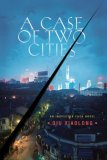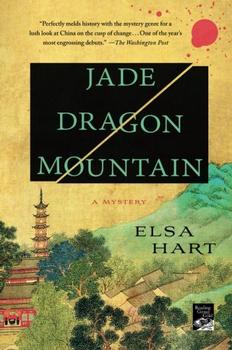Summary | Excerpt | Reviews | Beyond the book | Read-Alikes | Genres & Themes | Author Bio

Critics' Opinion:
Readers' Opinion:
First Published:
Nov 2006, 320 pages
Paperback:
Oct 2007, 320 pages
 Book Reviewed by:
Book Reviewed by:
BookBrowse Review Team
Buy This Book
This is the fourth volume in Xiaolong's
Inspector Chen series, but it is not necessary to have read the
earlier books to appreciate this one. The series, set
mainly in 1990s Shanghai (although about half the action in A
Tale of Two Cities takes place in Los Angeles), explores the
fast changing political and cultural climate of modern China
through the eyes of Inspector Chen who, like the author, came
across an English textbook as a teenager, which triggered a
lifelong interest in English poetry, particularly modernists
such as T.S. Eliot.
After graduating with a degree in literature, Chen was assigned
by the government to the Shanghai Police Bureau as a detective
and is now an Inspector in charge of the "special case squad"
which investigates political crimes. Chen's job requires him to
perform a delicate three-legged balancing act: staying true to
his own moral guidelines, staying on the right side of the
party, and staying alive - a challenging task considering the
well-connected villains he tracks down.
The consistent characters in the series are Chen; his partner Yu
Guangming and Yu's wife Peiqin, and Yu's father, a retired cop
named Old Hunter who, in the first book, ekes out his existence
on a tiny government pension but, in the second book has been
given the honorary, and salaried, role of traffic advisor by
Chen. Such nepotism may not sit well with readers brought up in
the West, but the reality for Xiaolong's characters is that to
fail to take advantage of the system to help a friend would
simply be folly, and their manipulation of the system is
entirely inconsequential compared with the corruption of the
many senior officials ("red topped rats") who liberate multiple
millions from the system to line their own pockets.
A Case of Two Cities fits into the police procedural
genre (known in China as "legal system mysteries") but the
atmosphere and insider viewpoint of modern-day Chinese culture
and politics puts it head and shoulders above the average
detective mystery.
Like P.D. James's Adam Dalgliesh, Inspector Chen is a poet; he
also earns a little money on the side translating Western crime
fiction into Chinese. To Western readers it might seem
implausible that Chen could be a poetry spouting cop, not to
mention that virtually everyone he meets of his generation is
also able to quote Confucius and a multitude of proverbs and
poets. However, in an interview at
JanuaryMagazine.com, Xiaolong explains that "most novels in
China contain much more poetry [than Western novels] .... at the
start of the chapter, at the end, and in the middle -- and
sometimes they use a poem to introduce a new character." So he
has tried to keep this tradition in his writing.
Xiaolong goes on to observe that not only can poetry be a way to
discreetly reveal a person's character, but that China has a
self-effacing culture in which, sometimes, when it is difficult
to say something in prose, people will fall back on poetry.
This circumspection is one of the many charms of A Case of
Two Cities. There is a formality to the language that is
very appealing; threats are couched in such graceful language
that it's doubtful whether a generation of Westerners brought up
on a diet of sound bites would even realize that they were being
threatened if so addressed!
On reading A Case of Two Cities one becomes conscious of
how muddied is the line between honesty and dishonesty in
countries such as China, Russia and India (as seen in
Sacred Games) where the economies are growing at such a
great rate that the opportunities for corruption are
overwhelming at many levels of society. It could be argued
that, in such a climate, it is not possible to remain strictly
honest to the letter of the law, and thus it is up to the
individual's own conscience to toe that very fine line between
what is morally right and wrong. Inspector Chen's awareness of
this quandary and his desire to do the right thing, coupled with
his frequent revulsion at his occupation, are what make him a
truly noble figure. The potential for corruption is constantly
presented to him like tasty dim sum, but he resists, even though
so many around him are gorging themselves on the opportunities.
Qiu Xiaolong (pronounced "chew-shao-long")
was born and raised in Shanghai. He
managed to avoid the worst of Mao
Zedong's Cultural Revolution by falling
ill with bronchitis at the age of 16, so
he was able to stay in the city while
his peers left to be "re-educated" in
the countryside. One day while sitting
on a bench in Shanghai's Bund he noticed
some people studying an English
book, which was the start of an interest
that grew into an academic specialty in
modernist poetry.
He came to the US in 1988, at the age of
about 30, on a Ford Foundation grant.
He chose to study at Washington
University in St. Louis, Missouri,
because of his enthusiasm for the poet
T.S. Eliot, who was brought up in St
Louis before emigrating to the UK at the
age of 25.
Following the Tiananmen Square massacre
he decided not to return to China and
instead managed to extricate his wife,
Wang Lijun. Today they live in St Louis
with their daughter, Julia.
Useful to know
In Chinese the family name comes first, e.g. Chief Inspector
Chen Cao's family name is Chen, his given name is Cao. However,
the author's name has been "anglicized" on the book jacket so
that Qiu is his given name and Xiaolong his family name.
Interesting Links:
Series Order
![]() This review was originally published in The BookBrowse Review in February 2007, and has been updated for the
October 2007 edition.
Click here to go to this issue.
This review was originally published in The BookBrowse Review in February 2007, and has been updated for the
October 2007 edition.
Click here to go to this issue.

If you liked A Case of Two Cities, try these:

by Qiu Xiaolong
Published 2022
The legendary Judge Dee Renjie investigates a high-profile murder case in this intriguing companion novel to Inspector Chen and the Private Kitchen Murder set in seventh-century China.

by Elsa Hart
Published 2016
On the mountainous border of China and Tibet in 1708, a detective must learn what a killer already knows: that empires rise and fall on the strength of the stories they tell.





The Funeral Cryer by Wenyan Lu
Debut novelist Wenyan Lu brings us this witty yet profound story about one woman's midlife reawakening in contemporary rural China.
Your guide toexceptional books
BookBrowse seeks out and recommends the best in contemporary fiction and nonfiction—books that not only engage and entertain but also deepen our understanding of ourselves and the world around us.